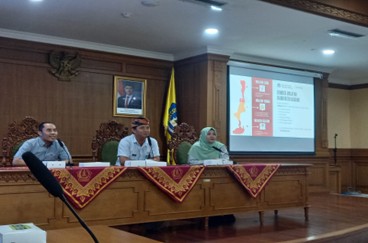The Undergraduate Program in Japanese Language and Culture, Faculty of Humanities, Diponegoro University, recently carried out a series of industrial and institutional visits as part of its Field Work Practice (Kuliah Kerja Lapangan/KKL) program. These activities aimed to provide students with real-world exposure by connecting classroom learning with professional practices. The first destination was PT Yakult Persada in Mojokerto, East Java, followed by the Badung Regency Department of Tourism in Bali.
On Tuesday (02/09/2025), the students visited PT Yakult Persada, Indonesia’s well-known producer of probiotic drinks. Upon arrival, each participant brought two empty Yakult bottles as part of the company’s recycling initiative. In the Public Relations room, Mr. Hendy introduced Yakult’s history, from Dr. Minoru Shirota’s 1930 discovery of the Lactobacillus Casei Shirota Strain to the global success of the brand, now marketed in more than 40 countries including Indonesia.
The students also learned about the production process—from cultivating bacteria under sterile conditions to bottling through machines capable of filling 4,500 bottles per hour. They were impressed not only by the technology but also by the company’s sustainability practices, such as recycling Yakult bottles into household furniture. The session ended with a lively Q&A, a plaque presentation, and a group photo to mark the occasion.

Two days later, on Thursday (04/09/2025), the KKL activities continued with a visit to the Badung Regency Department of Tourism in Bali. The group of 80 students and two lecturers were warmly welcomed by Mr. Agung, Acting Secretary of the Tourism Office. He shared strategies on destination management, sustainable tourism policies, and the regency’s success as one of Bali’s top international tourism hubs.
Students gained insights into Badung’s tourism clusters: the south for starred accommodations and MICE, the central Canggu area for urban and entertainment tourism, and the north for agro-tourism projects. They also learned how the regency revitalized its attractions after the pandemic, including the major redevelopment of Kuta Beach. The involvement of youth in digital promotions, creative businesses, and tourism villages was highlighted as a vital part of keeping Bali’s tourism innovative and community-based.
Both visits offered valuable experiences from different perspectives. At Yakult, students observed how science, health, and sustainability work together in industry, while in Bali they saw how tourism can be managed responsibly to benefit communities and empower the younger generation. Together, these visits broadened the students’ horizons and inspired them to apply their knowledge beyond the classroom.

